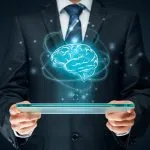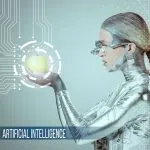Imagine stepping into a world where a car recognizes its environment to navigate rush-hour traffic with precision, or where your smartwatch predicts health issues before symptoms arise, nudging you toward better choices. It’s a world where machines don’t just assist us but learn and evolve alongside us, seamlessly integrating into the fabric of our daily lives. A world where cars glide down roads without drivers, where doctors use powerful algorithms to diagnose illnesses faster and more accurately, and where technology anticipates our needs before we even express them. This isn’t a futuristic dream—it’s the reality unfolding right now, powered by artificial intelligence. Exploring its impact on industries, its challenges, and the ethical dilemmas it presents. Our guest, Akshay Williams, brings a wealth of insight to this exciting and often mysterious topic.
Artificial intelligence, or AI, is more than just a buzzword. It’s about creating machines that think, learn, and act in ways that mimic human intelligence. Picture systems capable of sifting through vast amounts of data in the blink of an eye, spotting patterns invisible to the human eye, and continuously improving as they learn. Technologies like machine learning and natural language processing form the backbone of AI, revolutionizing everything from how we work to how we live. As Akshay Williams eloquently states, “AI is not just a tool; it’s a paradigm shift in how we solve problems.”
Take healthcare, for example. AI is breaking barriers by diagnosing diseases earlier than ever and personalizing treatments to suit individual needs. For instance, in one groundbreaking case, an AI system analyzed thousands of patient records to identify subtle signs of lung cancer that even seasoned doctors had overlooked. The system not only flagged the early stages of the disease but also recommended tailored treatment options based on the patient’s unique genetic makeup, demonstrating how AI can revolutionize the way we approach healthcare. Imagine a world where algorithms not only detect cancer but also predict the best course of action for each patient. Meanwhile, the transportation industry is racing ahead with self-driving cars that promise to make roads safer and commutes more efficient. Even the retail world is transforming, with predictive analytics helping stores stock exactly what customers want, when they want it. As Akshay points out, “These innovations aren’t just about convenience; they’re about enhancing the quality of life for everyone.”
But as we embrace these advancements, the question of jobs looms large. Will automation erase roles or open doors to entirely new opportunities? The truth lies somewhere in between. While some traditional jobs may vanish, new roles—like data analysts, AI trainers, and even professions we haven’t yet imagined—are emerging. Akshay emphasizes that adaptability is key: “The jobs of tomorrow will demand skills we need to start developing today. Lifelong learning isn’t just a buzzword—it’s a necessity.” Preparing for this shift requires collaboration among governments, educators, and businesses to ensure the workforce is equipped for the future.
With AI’s rapid growth comes a complex web of ethical challenges. How do we ensure these systems are fair, transparent, and accountable? How do we prevent biases from creeping into algorithms that make decisions affecting millions of lives? Akshay underscores the need for transparency: “We need to understand not just what AI is doing, but how it’s doing it. That’s the only way to build trust.” Developing ethical AI requires clear guidelines, cooperation among global leaders, and a commitment to putting humanity first.
As we look ahead, the path to an AI-driven future is paved with both opportunities and obstacles. Investing in education and innovation is essential, as is creating safety nets for those at risk of being left behind. Public-private partnerships will be instrumental in ensuring that no one is excluded from the benefits of AI. “The future isn’t something we passively wait for—it’s something we actively shape,” Akshay reminds us, urging society to approach this new frontier with both curiosity and responsibility.
Artificial intelligence isn’t just a technological breakthrough—it’s a story about humanity’s ability to dream, innovate, and adapt. It challenges us to think bigger, act more responsibly, and embrace change with open arms. As we harness its potential, the ultimate goal must be to use AI as a force for good—a tool that uplifts, empowers, and connects us all.











Comments